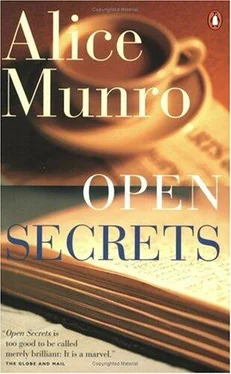The Monks’ dog had come up and was nosing in between them. Wayne knew its name.
“Get down, Rory! Get down, Rory!” he yelled as he yanked at Rhea’s crinoline.
The warning was from her stomach, which was being shoved so tightly against the wall. The back door opened, Wayne said something clearly into her ear — she would never know which of these things happened first — and she was suddenly released and began to vomit. She had no intention of vomiting until she started. Then she went down on her hands and knees and vomited until her stomach felt wrung out like a poor rotten rag. When she finished, she was shivering as if a fever had hit her, and her dance dress and crinoline were wet where the vomit had splattered.
Somebody else — not Wayne — pulled her up and wiped her face with the hem of the dress.
“Keep your mouth closed and breathe through your nose,” Mrs. Monk said. “You get out of here,” she said either to Wayne or to Rory. She gave all of them their orders in the same voice, without sympathy and without blame. She pulled Rhea around the house to her husband’s truck and half hoisted her into it.
Rhea said, “Billy.”
“I’ll tell your Billy. I’ll say you got tired. Don’t try to talk.”
“I’m through throwing up,” Rhea said.
“You never know,” said Mrs. Monk, backing the truck out onto the road. She drove Rhea up the hill and into her own yard without saying anything more. When she had turned the truck around and stopped, she said, “Watch out when you’re stepping down. It’s a bigger step than a car.”
Rhea got herself into the house, used the bathroom without closing the door, kicked off her shoes in the kitchen, climbed the stairs, wadded up her dress and crinoline, and pushed them far under the bed.
Rhea’s father got up early to gather the eggs and get ready to go to Hamilton, as he did every second Sunday. The boys were going with him — they could ride in the back of the truck. Rhea wasn’t going, because there would not be room in front. Her father was taking Mrs. Corey, whose husband was in the same hospital as Rhea’s mother. When he took Mrs. Corey with him, he always put on a shirt and a tie, because they might go into a restaurant on the way home.
He came and knocked on Rhea’s door to tell her they were leaving. “If you find time heavy, you can clean the eggs on the table,” he said.
He walked to the head of the stairs, then came back. He called through her door, “Drink lots and lots of water.”
Rhea wanted to scream at them all to get out of the house. She had things to consider, things inside her head that could not get free because of the pressure of the people in the house. That was what was causing her to have such a headache. After she had heard the truck’s noise die away along the road, she got out of bed carefully, went carefully downstairs, took three aspirins, drank as much water as she could hold, and measured coffee into the pot without looking down.
The eggs were on the table, in six-quart baskets. There were smears of hen manure and bits of straw stuck to them, waiting to be rubbed off with steel wool.
What things? Words, above all. The words that Wayne had said to her just as Mrs. Monk came out the back door.
I’d like to fuck you if you weren’t so ugly .
She got dressed, and when the coffee was ready she poured a cup and went outside, out to the side porch, which was in deep morning shade. The aspirins had started to work and now instead of the headache she had a space in her head, a clear precarious space with a light buzz around it.
She was not ugly. She knew she was not ugly. How can you ever be sure that you are not ugly?
But if she was ugly, would Billy Doud have gone out with her in the first place? Billy Doud prided himself on being kind.
But Wayne was very drunk when he said that. Drunkards speak truth.
It was a good thing she was not going to see her mother that day. If she ever wormed out of Rhea what was the matter — and Rhea could never be certain that she would not do that — then her mother would want Wayne chastised. She would be capable of phoning his father, the minister. The word “fuck” was what would incense her, more than the word “ugly.” She would miss the point entirely.
Rhea’s father’s reaction would be more complicated. He would blame Billy for taking her into a place like Monk’s. Billy, Billy’s sort of friends. He would be angry about the fuck part, but really he would be ashamed of Rhea. He would be forever ashamed that a man had called her ugly.
You cannot let your parents anywhere near your real humiliations.
She knew she was not ugly. How could she know she was not ugly?
She did not think about Billy and Wayne, or about what this might mean between them. She was not as yet very interested in other people. She did think that when Wayne said those words, he used his real voice.
She did not want to go back inside the house, to have to look at the baskets full of dirty eggs. She started walking down the lane, wincing in the sunlight, lowering her head between one island of shade and the next. Each tree was different there, and each was a milestone when she used to ask her mother how far she could go to meet her father, coming home from town. As far as the hawthorn tree, as far as the beech tree, as far as the maple. He would stop and let Rhea ride on the running board.
A car hooted from the road. Somebody who knew her, or just a man going by. She wanted to get out of sight, so she cut across the field that the chickens had picked clean and paved slick with their droppings. In one of the trees at the far side of this field, her brothers had built a tree house. It was just a platform, with boards nailed to the tree trunk for you to climb. Rhea did that — she climbed up and sat on the platform. She saw that her brothers had cut windows in the leafy branches, for spying. She could look down on the road, and presently she saw a few cars bringing country children into town to the early Sunday school at the Baptist Church. People in the cars couldn’t see her. Billy or Wayne wouldn’t be able to see her, if by any chance they should come looking with explanations or accusations or apologies.
In another direction, she could see flashes of the river and a part of the old fairgrounds. It was easy from here to make out, in the long grass, where the racetrack used to go round.
She saw a person walking, following the racetrack. It was Eunie Morgan, and she was wearing her pajamas. She was walking along the racetrack, in light-colored, maybe pale pink, pajamas, at about half past nine in the morning. She followed the track until it veered off, going down to where the riverbank path used to be. The bushes hid her.
Eunie Morgan with her white hair sticking up, her hair and her pajamas catching the light. Like an angel in feathers. But walking in her usual awkward, assertive way — head pushed forward, arms swinging free. Rhea didn’t know what Eunie could be doing there. She didn’t know anything about Eunie’s disappearance. The sight of Eunie seemed both strange and natural to her.
She remembered how on hot summer days, she used to think that Eunie’s hair looked like a snowball or like threads of ice preserved from winter, and she would want to mash her face against it, to get cool.
She remembered the hot grass and garlic and the jumping-out-of-your-skin feeling, when they were turning into Toms.
She went back to the house and phoned Wayne. She counted on his being home and the rest of his family in church.
“I want to ask you something and not on the phone,” she said. “Dad and the boys went to Hamilton.”
Читать дальше













